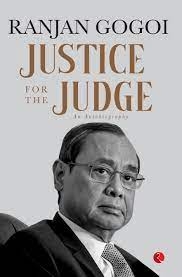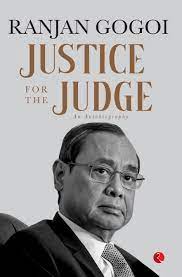
.jpg) Mathew John
Mathew John

There is an old Arab proverb that you should write the bad things that happen to you in the sand so that they can be easily erased from your memory. I would add that the bad things that you have done should also be written in sand so that they can hopefully be erased from your and the public memory.
Which brings me to the gaffe of the expiring year, 2021. Indubitably, that dubious honour goes to the controversial retired Chief Justice, Ranjan Gogoi, who did not write the bad things that he did in the sand but in the form of his autobiography titled “Justice for the Judge”. It has turned out into a humongous clanger, further compounded by the rash of foot in the mouth interviews that he gave to the electronic media.
As his version of the controversial verdicts on the sexual harassment charges, Rafale, Ayodhya, the Assam NRC have already been analyzed threadbare and his apologia torn to shreds, I propose to focus, instead, on the overall merits of the book in terms of authenticity and the insights it provides into the psyche of the author.
Located where I am, I could not get a hard copy of his book, which is how I like to do my reading, but being of immediate topical interest, I ventured to ask the dear spouse to download the book on her kindle. My request was met with utter disdain. She reminded me of Mark Twain’s observation that a man who reads trash has no advantage over the man who cannot read but notwithstanding the insult, I got to read the book on her kindle. In retrospect, her pre-emptive judgement of Ranjan Gogoi’s autobiography was spot on!
Two of the greatest writers and humanists have cautioned about the hazards of writing an autobiography. George Orwell had this to say: “Autobiography is only to be trusted when it reveals something disgraceful. A man who gives a good account of himself is probably lying, since any life when viewed from the inside is simply a series of defeats.” Mark Twain was even more scathing in his diagnosis: “An autobiography is the truest of books, for while it inevitably consists mainly of extinctions of the truth…. the remorseless truth is there between the lines, where the author-cat is raking dust upon it which hides from the disinterested spectator neither it nor its smell…. the results being that the reader knows the author despite his wily diligences.” The former Chief Justice has clearly learnt nothing from such cautionary warnings.
His autobiography, written in syntax-challenged, cliche-ridden, desultory prose is a resounding vindication of the two great writers’ belief that an autobiography is a cesspool of falsehoods and half-truths, which inevitably exposes the author’s many blemishes. To give one example of the twisted verbiage of the conflicted soul: “…. why from one perspective the institution may appear to be shrouded in opacity and why, at the same time, this may be necessary. I also disclose that opacity or lack of transparency is not synonymous with absence of correct and cogent reasons for decisions taken.”
The book kicks off on the wrong foot. The blurb announces the book as “the story of a man of consummate ambition”, at best a left-handed compliment when one considers that overweening ambition has a tendency to dispense with other human values. One is then struck by the author’s use of “Prologue” for the introduction to his book, a term that is normally deployed as a rubric for the introductory section in a fictional or dramatic work, but having diligently ploughed through the contents, I cannot help but conclude that it is a Freudian slip considering the profusion of fiction in the narration.
This autobiography holds interest only because it is arguably about the most infamous period in the history of the Supreme Court when he was the CJI. His prologue immediately puts one on guard. When the author proclaims that he would be giving “an accurate perspective of the working of the judicial system, clearing of the fog of misinformation” and how he showed “the courage to take decisions, true to his conscience, without favour and fear of consequences or brickbats from certain quarters”, the reader knows that he has to watch out.
Gogoi declares that his book is a “frank revelation” of happenings, and that he has been “as forthright as always”. Coming from a man who used the “sealed cover” trickery to conceal critical information from the public in the Rafale case, who resorted to the secret in-house procedure to shroud the investigation of the sexual assault allegations against him, and who shelved the Kashmir habeas corpus and electoral bond petitions in a sellout to the political executive, that’s a bit rich.
The fictional element in the telling of his life story is straightaway apparent. Can you trust a man who dresses up even his failures so that they are never attributed to his own inadequacy but are due to somebody else or quirky fate? About his performance in the Civil Services examination, he states that he qualified for the interview and then: “All went well until I reached the last person on the interview panel -- Dr Sarup Singh, former VC of DU. I gave a reply that made Dr Singh considerably agitated. I sensed that I had been eliminated. I was proved right when the results were declared.”
Gogoi’s version is a complete misrepresentation of the selection process for IAS recruitment of his time. A candidate’s suitability was adjudged, not on a single answer in the half-hour interview before a full-fledged board but on his overall score in the written exam and interview combined comprising 1750 marks, of which 300 marks were earmarked for the interview. Gogoi insults the reader with such mendacious hogwash!
It is difficult to respect a man who gives inconsistent, even contradictory arguments to justify his actions. About the Ayodhya case reaching fruition in his watch, Gogoi boasts: “While the contribution of my brother judges…. must be acknowledged, what cannot be lost sight of is that without the iron will of the CJI as the leader, the culmination of the matter would not have been possible.” In effect, he confirmed the status of the CJI as the driving force in the Court hierarchy who has his way when he decides to.
Now for the doublespeak when confronted with his biggest test as CJI -- his alleged sexual assault of a junior court functionary. As the accused in the case, he breached all norms of jurisprudence by presiding over the first committee that issued an “innocent” order (but actually a pre-emptive order) urging the media to show restraint in the coverage of “wild and scandalous allegations which irreparably damage reputation and negate independence of judiciary.”
By his direct involvement in the whole process, including nomination of the investigative head of the in-house committee to decide his own case, he was certainly displaying the “iron will of the CJI as leader” -- his phrase congratulating himself on the Ayodhya verdict. And yet he has the gall to suggest that although in hindsight he should not have been on the committee, he had ensured an impartial probe by appointing his good friend, Justice Bobde, to head the in-house inquiry committee that dismissed the charges.
His point-blank refusal to set up a committee of retired SC judges or outsiders to probe the charges on the grounds that it vitiated the laid-down procedures for such in-house committees contradicts the strong views expressed by him on Rafale: “The highest court in the land cannot be understood to be entrapped by any particular procedure and must always be left with the freedom to develop its own procedures from time to time.” Expediency was what determined his actions as CJI and not principle.
Democracy is best served when there is a putative tension between the judiciary and the political executive, more so at a time when the democratic space is shrinking. But Gogoi sees the relationship in an altogether different light. According to his version of judicial autonomy, “our judges have perfected the means of retaining their independence without getting into any confrontation with the executive”, which is, in truth, an accurate and polite description of a compromised judiciary.
While the world expressed concerns regarding the exercise of arbitrary executive power and diminishing freedoms in India, the Supreme Court, during his tenure as Chief Justice, helped the executive in its dirty work by drawing a veil of secrecy through the “sealed cover” subterfuge in the Rafale case and by endorsing the lame government trope of “national security”. With the very same intent of helping the regime, he relegated to the back burner the habeas corpus petitions of Kashmir and the foul-smelling electoral bonds issue for the flimsiest of reasons. Although he has not said so in his book, he can rightfully claim credit for doing more than any other public functionary to shore up a corrupt, majoritarian government.
It is no surprise that a recurring theme throughout is his apoplectic rage against a certain section of civil society that he does not name, but we know who they are. Doppelgänger-like, he shares the present regime’s hostility toward dissidents and critics who have relentlessly focused on exposing the transgressions of the governing elite. Sadly for him, his memoirs have provided grist for even more lethal attacks on his legacy.
Given the fierce blowback that has greeted his autobiography, he must surely be ruing the fact that the ink didn’t run dry before he put pen to paper. Anyone who has had the strength of will to be able to go through this book will confirm that Gogoi’s disingenuous repetition of his own past has been an unmitigated disaster. My studied assessment is that by writing his autobiography, the former CJI has authored his own infamy!
(The writer is a former civil servant)